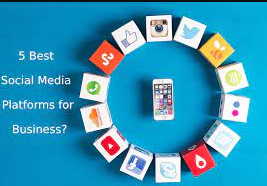When it comes to choosing the Best social media for small business platform for a small business, several factors should be considered, including the target audience, business goals, and available resources. While there are many social media platforms available, here are some popular ones that can be effective for small businesses:
- Facebook: With over 2.8 billion monthly active users, Facebook offers a broad reach and diverse audience targeting options. It allows businesses to create a page, share updates, engage with customers through comments and messages, and run targeted advertising campaigns.
- Instagram: Particularly useful for businesses with visually appealing products or services, Instagram has over 1 billion monthly active users. It focuses on visual content such as photos and videos, making it a great platform for showcasing products, sharing behind-the-scenes content, and leveraging influencer marketing.
- Twitter: Known for its real-time and concise nature, Twitter can be beneficial for businesses that want to share quick updates, engage in conversations with customers and industry influencers, and provide customer support.
- LinkedIn: Primarily a professional networking platform, LinkedIn is ideal for B2B (business-to-business) businesses or those targeting professionals. It allows companies to create a business page, share industry insights, connect with potential clients or partners, and post job openings.
Remember, it’s crucial to research and understand your target audience’s preferences and habits to determine which social media platforms they use most. It’s often better to focus on a few platforms where your audience is most active rather than spreading yourself too thin across numerous platforms. Regularly monitor and analyze your social media performance to refine your strategy and make improvements based on data-driven insights.
Best social media platform
When it comes to choosing the best social media platform for a small business, there are several options to consider. The suitability of a particular platform depends on factors such as your target audience, business goals, and the type of content you want to share. Here are some popular social media platforms that can be effective for small businesses:
- It offers a wide range of targeting options, allowing businesses to reach their desired audience. Facebook Pages provide a platform for businesses to share updates, photos, videos, and engage with customers through comments and messages. The platform also offers advertising options to promote your business to a larger audience.
- Instagram: Known for its visual focus, Instagram has more than 1 billion monthly active users. It is particularly effective for businesses that have visually appealing products or can showcase their services through images and videos. Instagram allows you to create a business profile, share high-quality visuals, use relevant hashtags, engage with followers through comments and direct messages, and leverage influencer marketing.
- Twitter: Twitter is a real-time platform with around 330 million monthly active users. It is suitable for businesses that want to share quick updates, industry news, engage in conversations with customers and industry influencers, and provide customer support. Twitter’s character limit encourages concise and engaging content.
- LinkedIn: LinkedIn is a professional networking platform with over 700 million members. It is beneficial for B2B businesses or those targeting professionals. Businesses can create a company page, share industry insights, connect with potential clients or partners, and post job openings. LinkedIn also offers advertising options and the ability to join relevant industry groups.
Certainly! Here are some more detailed insights into the best social media platforms for small businesses:
platforms for small businesses
- Facebook:
- Audience: Facebook has a diverse user base, making it suitable for targeting a wide range of demographics. It is especially popular among adults aged 25-54.
- Features: Facebook Pages allow businesses to create a professional presence, share updates, photos, videos, and links. You can engage with customers through comments, messages, and live chat. The platform also provides detailed analytics and advertising options for targeting specific audiences.
- Benefits: Facebook’s broad reach, robust targeting options, and ability to foster community engagement make it a versatile platform for small businesses.
- Instagram:
- Audience: Instagram has a predominantly younger audience, with a significant user base under the age of 35. It attracts users interested in visual content and lifestyle-related topics.
- Features: Instagram focuses on sharing photos and videos, with options for adding captions, hashtags, and location tags. Stories and Reels offer additional interactive features. The platform supports direct messaging and provides insights into your content’s performance.
- Benefits: Instagram’s visually-driven nature makes it ideal for showcasing products, lifestyle branding, and influencer collaborations. It can help small businesses build a visually appealing and engaging brand presence.
- Twitter:
- Audience: Twitter has a diverse user base, but it skews towards younger demographics and professionals who prefer real-time information and news updates.
- Features: Twitter allows you to share short messages (tweets) of up to 280 characters. It offers hashtags for categorizing content and engaging in trending conversations. Twitter also supports multimedia content, direct messaging, and customer service interactions.
- Benefits: Twitter enables businesses to join industry conversations, provide quick updates, and engage directly with customers. It can be effective for building brand awareness, staying informed about industry trends, and addressing customer concerns promptly.
- LinkedIn:
- Audience: LinkedIn is a professional networking platform primarily used by professionals, businesses, and job seekers. It has a higher concentration of college-educated users.
- Features: LinkedIn offers business pages to showcase your company, share industry insights, and engage with a professional audience. It supports long-form articles, job postings, and networking through connections and industry groups. Advertising options are available for B2B targeting.
Remember, the most effective social media platform for your small business

